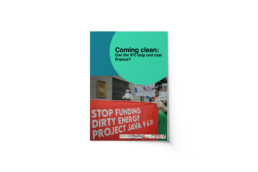Coming clean: Can the IFC help end coal finance?
There has been a quiet revolution in the world of high finance. For years the World Bank’s private sector arm, the International Finance Corporation (IFC), had been providing support for coal mines and power plants through indirect investments – called financial intermediaries (FIs), such as commercial banks and private equity funds. Local communities discovered that the coal plant they were protesting against was financed not just by their national banks – like Axis in India, or Rizal Commercial Banking Corporation (RCBC) in the Philippines – but also by the world’s premier development bank.
In 2018, IFC’s CEO, Philippe Le Houérou, signalled a new direction for IFC in response to public outcry. “Over the past few years, civil society groups have been critical of IFC for supporting financial intermediaries that have coal exposures,” he wrote. “In response, we have changed our policy … to vastly reduce our direct and indirect exposure to coal in new financial intermediaries projects.”
This matters, since what IFC does, others follow. IFC is the standard setter for both the private sector and those who lend to them: IFC’s Performance Standards are the blueprint for the world’s 32 export credit agencies, for the 110 banks of the Equator Principles3, and for other development finance institutions. An estimated $4.5 trillion in investments across emerging markets adhere to IFC’s Performance Standards on Environmental and Social Sustainability. On its own account, IFC is a significant player: its current investment portfolio totals nearly $59 billion, and of the $19 bn it invested in 2019, over 60% went to FIs.


